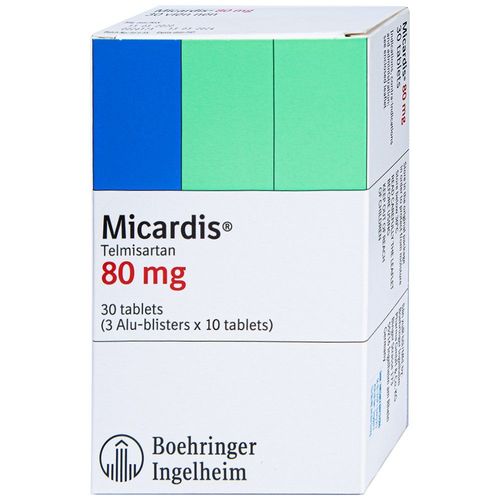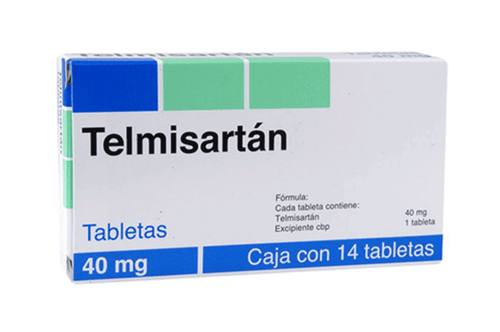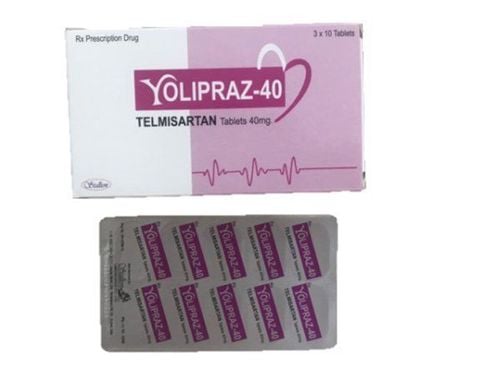This is an automatically translated article.
Eutelsan is made in the form of tablets, with the main ingredient being Telmisartan. The drug is used in the treatment of hypertension, prevention of cardiovascular disease,...
1. What is Eutelsan?
What is Eutelsan? Eutelsan 20mg medicine has the main ingredient Telmisartan 20mg and other excipients. Telmisartan is a non-peptide, benzimidazole derivative that is a specific antagonist of the Angiotensin II (type A1) receptor in vascular and adrenal smooth muscle. It has the effect of blocking the binding of Angiotensin to the AT1 receptor, causing vasodilation, reducing the effect of Aldosteron.
Unlike other angiotensin converting enzyme inhibitors, Telmisartan does not inhibit bradykinin degradation, so it does not cause persistent cough (side effect of ACE inhibitor therapy). Therefore, this medicine is used for people who have to stop taking ACE inhibitors because of a persistent cough.
In humans, a dose of telmisartan 80 mg almost completely inhibits the blood pressure-raising effect of angiotensin II. In hypertensive patients, telmisartan reduces diastolic and systolic blood pressure without altering heart rate. If telmisartan is discontinued, the patient's blood pressure should gradually return to pre-treatment values within a few days, with no rebound hypertension. At the same time, Telmisartan also reduces the rate of progression of kidney disease or microalbuminuria in diabetic patients. Besides, Telmisartan is also used in the treatment of congestive heart failure.
Indications for use of Eutelsan:
Treatment of hypertension, can be used alone or in combination with other antihypertensive drugs; Used as an alternative to ACE inhibitors in the treatment of diabetic kidney disease or heart failure; Cardiovascular disease prevention, reduced cardiovascular morbidity in adults with atherothrombotic cardiovascular disease (stroke, history of coronary artery disease, peripheral coronary artery disease) or documented type 2 diabetes target organ damage. Contraindications to using Eutelsan:
Patients with hypersensitivity to Telmisartan or other components of the drug; Patients with obstructive disorders of the biliary tract; Patients with severe liver failure; Women in the second and third trimesters of pregnancy; Women who are breastfeeding; In combination with aliskiren in patients with diabetes or renal failure (GFR less than 60m/min/1.73m2).
2. Usage and dosage of Eutelsan
Usage: Orally. Patients can take Eutelsan with or without food, once a day.
Dosage:
Treatment of hypertension: The usual dose is 40mg/time/day. For some patients, a dose of 20mg may be needed only once a day. In the event that target blood pressure is not achieved, the dose may be increased to a maximum of 80 mg once daily. In addition, Telmisartan can be combined with thiazide diuretics such as hydrochlorothiazide for a better antihypertensive effect. When considering increasing dosing, attention should be paid to the maximal hypotensive effect, which is usually achieved 4 to 8 weeks after initiation of therapy; Cardiovascular disease prevention: The recommended dose is 80mg/time/day. It is not clear whether doses lower than 80 mg once daily are effective in reducing the risk of cardiovascular disease. When initiating treatment with telmisartan to reduce the incidence of cardiovascular disease, patients should closely monitor blood pressure and adjust antihypertensive drugs if necessary; Patients with renal impairment: There is not much experience with the use of Eutelsan in patients with severe renal impairment or on hemodialysis. In these patients, a starting dose of 20 mg is recommended. For patients with mild and moderate renal impairment, no dose adjustment is required; Patients with hepatic impairment: Eutelsan is contraindicated in patients with severe hepatic impairment. For patients with mild and moderate hepatic impairment, the maximum dose is 40mg/time/day; Elderly: No need to change the dose of Eutelsan; Children: There are no studies on the safety and effectiveness of Eutelsan in people under 18 years of age. Overdose: The most characteristic symptoms of Telmisartan overdose are tachycardia, hypotension, dizziness, bradycardia, increased serum creatinine, and acute renal failure. Patients with drug overdose should be closely monitored and treated symptomatically and supportively.
The management of overdose depends on the duration of the drug and the severity of the symptoms. Suggested measures include induction of vomiting, gastric lavage, and use of activated charcoal. Patients should be monitored regularly for electrolytes and serum creatinine. If the patient has low blood pressure, the patient should be placed in the supine position, promptly add salt and fluid.
3. Side effects of Eutelsan
The side effects of Telmisartan are usually mild and transient, so patients rarely need to stop taking the drug. When using Eutelsan, patients may experience some side effects such as:
Uncommon: Fatigue, excessive hypotension, headache, dizziness (especially in patients with fluid loss such as diuretics). high dose), limb edema, angioedema, blurred vision, profuse sweating, anxiety, dizziness, agitation, nausea, dry mouth, dyspepsia, abdominal pain, acid reflux, flatulence, diarrhea, anorexia, impaired renal function, urinary tract infection, increased creatinine and blood urea, sinusitis, pharyngitis, upper respiratory tract infection, flu-like symptoms (cough, earache, nasal congestion, fever, runny nose, sore throat, sneezing), muscle pain and spasms, back pain, tendinitis-like symptoms, hyperkalemia; Rare: Angioedema, visual disturbances, tachycardia, excessive hypotension or syncope (common in hypovolemic or salt-reduced patients, taking diuretics), gastrointestinal bleeding, rash skin, skin itching, urticaria, increased liver enzymes, decreased neutrophils, decreased hemoglobin, increased blood uric acid, increased blood cholesterol. Patients should inform their doctor about the side effects when taking Eutelsan for appropriate interventions and management.
4. Be careful when using Eutelsan
Some notes for patients to remember before and while taking Eutelsan:
Do not use Eutelsan for patients with cholestasis, severe liver failure, or biliary obstructive disorders, because Telmisartan is largely eliminated via the bile. Telmisartan hepatic clearance will be reduced in these patients. In patients with mild to moderate hepatic impairment, Telmisartan should be used with caution; The use of telmisartan increases the risk of hypotension and renal failure in patients with renal artery stenosis; When telmisartan is used in patients with impaired renal function, periodic monitoring of serum potassium and creatinine levels is recommended. There is no experience with this drug in kidney transplant patients; When using Telmisartan, there may be a risk of hypotension in patients with intravascular volume depletion, sodium depletion due to strong diuretic use, low salt diet, diarrhea or vomiting. These conditions need to be treated before taking Telmisartan; There is evidence that concomitant use of angiotensin II receptor blockers, aliskiren, or ACE inhibitors increases the risk of hypotension, hyperkalemia, and impaired renal function (including acute renal failure). If dual inhibitor therapy is required, it should be closely monitored by a physician, with close monitoring of renal function, blood pressure, and electrolytes. Also, ACE inhibitors and angiotensin II receptor blockers should not be used at the same time in people with diabetic nephropathy; In patients whose vascular tone and renal function depend on the activity of the renin - angiotensin - aldosterone system (patients with severe congestive heart failure or with renal disease, including renal artery stenosis), the use of telmisartan can cause acute hypotension, increased blood nitrogen, oliguria, acute renal failure; Patients with primary hyperaldosteronism are not advised to use telmisartan; Be especially careful when using Telmisartan in patients with aortic stenosis, mitral stenosis, obstructive myocardial hypertrophy; In diabetic patients being treated with insulin or antidiabetic drugs, the use of telmisartan may cause hypoglycaemia. Therefore, appropriate monitoring of blood glucose is recommended, and adjustment of the dose of insulin or antidiabetic drugs may be necessary when indicated; The use of Telmisartan can cause hyperkalemia. In the elderly, patients with renal failure, diabetes, concomitant use of drugs that can cause hyperkalemia or people with other diseases, hyperkalemia can lead to death. Close monitoring of serum is recommended in patients at high risk for hyperkalemia; When using Eutelsan, if too much blood pressure is lowered in people with ischemic heart disease or ischemic cardiovascular disease, it can cause myocardial infarction, stroke; Eutelsan contains the excipients tarrazine, which can cause allergic reactions; Telmisartan should not be used during the first 3 months of pregnancy, if you intend to become pregnant, another drug should be used before becoming pregnant. Telmisartan should not be used after the 3rd month of pregnancy, as it may cause harm to the fetus (hypotension, renal failure, anuria, craniocervical hypoplasia in the infant, fetal death) or low water intake. Amniotic fluid in the mother,... When pregnancy is detected, Telmisartan should be discontinued as soon as possible; Telmisartan is contraindicated in nursing women, as it is not known whether this ingredient is excreted in human milk. To be on the safe side, breast-feeding should be discontinued or the drug should be discontinued as appropriate; Eutelsan drug can cause dizziness, lightheadedness due to low blood pressure, so caution should be exercised when driving, operating machinery, ...
5. Eutelsan 20 . drug interactions
Some of the drug interactions of Eutelsan include:
The use of dual inhibitors of the renin - angiotensin - aldosterone system (RAAS) in combination with an angiotensin II receptor blocker or aliskiren, an ACE inhibitor can cause increased side effects such as hypotension, hyperkalemia, and acute renal failure compared with RAAS inhibitors alone; Concomitant use of digoxin with telmisartan may increase plasma concentrations of digoxin. Blood levels of digoxin should be monitored at the start of treatment. Telmisartan can be adjusted or discontinued to avoid an overdose of digoxin; Telmisartan in combination with drugs such as potassium-sparing diuretics, ACE inhibitors, potassium-containing salts, angiotensin II receptor blockers, nonsteroidal anti-inflammatory drugs, heparin, immunosuppressants, trimethoprim) may cause an increase blood potassium. If concurrent use is indicated due to hypokalemia, the drug should be used with caution, with regular monitoring of blood potassium; Concomitant use of Lithium with Telmisartan may increase serum lithium concentrations and increase toxicity. If it is necessary to combine 2 drugs, careful monitoring of the concentration of Lithium in the serum is recommended; Nonsteroidal anti-inflammatory drugs may reduce the antihypertensive effect of telmisartan. In some patients with impaired renal function (dehydration patients, elderly patients with impaired renal function), the concomitant use of telmisartan and cyclo-oxygenase inhibitors may lead to renal failure. Drug combinations should be used with caution, especially in the elderly. Patients should drink enough fluids, consider monitoring renal function after initiation of the combination and periodically thereafter; Persons being treated with high-dose diuretics such as furosemide and hydrochlorothiazide may experience decreased intravascular volume and hypotension when initiating telmisartan; The antihypertensive effect of telmisartan may be increased if other antihypertensive drugs are used (baclofen, amifostine). In addition, orthostatic hypotension may be more severe if the patient uses alcohol, narcotics, antidepressants, barbiturates; Concomitant administration of telmisartan with corticosteroids (systemic route) may reduce the antihypertensive effect. When prescribed Eutelsan 20, patients should strictly follow the instructions of the doctor, not increase the dose, reduce the dose or change the duration of drug use. This has an important meaning in ensuring effective treatment of hypertension, reducing the incidence of cardiovascular diseases, limiting the risk of side effects,...
Follow the website of General Hospital Vinmec International to get more health, nutrition, and beauty information to protect the health of yourself and your loved ones in your family.
Please dial HOTLINE for more information or register for an appointment HERE. Download MyVinmec app to make appointments faster and to manage your bookings easily.













